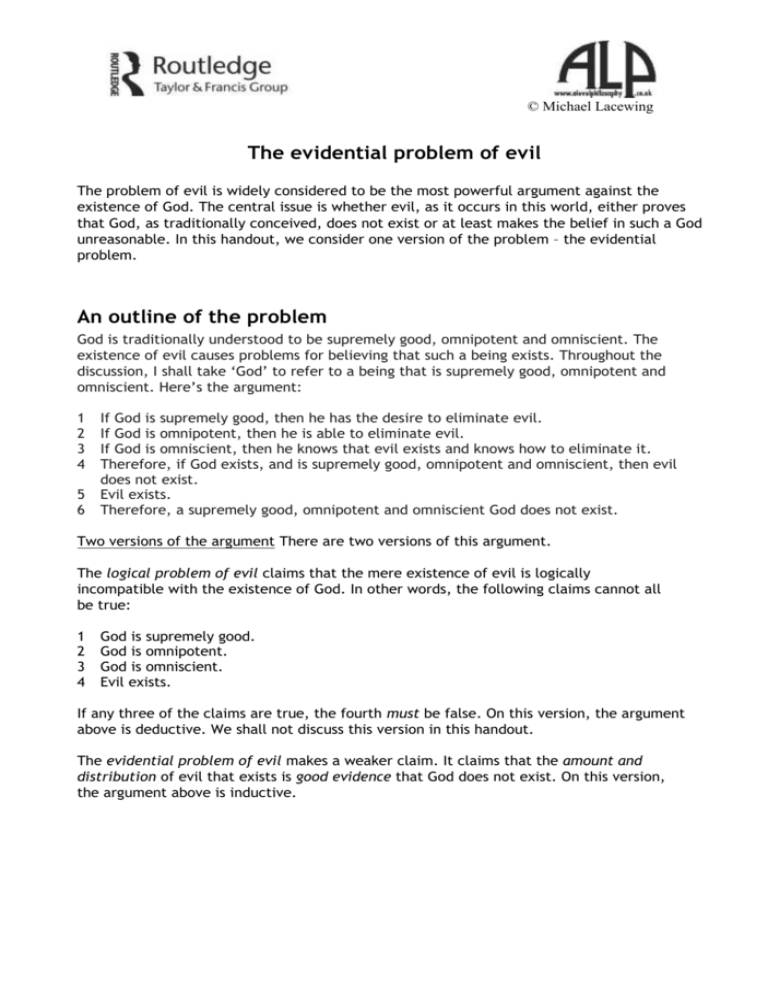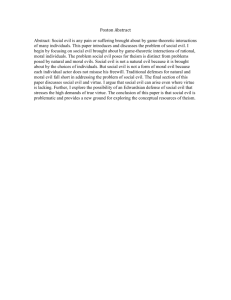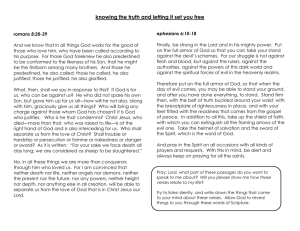The evidential problem of evil
advertisement

© Michael Lacewing The evidential problem of evil The problem of evil is widely considered to be the most powerful argument against the existence of God. The central issue is whether evil, as it occurs in this world, either proves that God, as traditionally conceived, does not exist or at least makes the belief in such a God unreasonable. In this handout, we consider one version of the problem – the evidential problem. An outline of the problem God is traditionally understood to be supremely good, omnipotent and omniscient. The existence of evil causes problems for believing that such a being exists. Throughout the discussion, I shall take ‘God’ to refer to a being that is supremely good, omnipotent and omniscient. Here’s the argument: 1 2 3 4 5 6 If God is supremely good, then he has the desire to eliminate evil. If God is omnipotent, then he is able to eliminate evil. If God is omniscient, then he knows that evil exists and knows how to eliminate it. Therefore, if God exists, and is supremely good, omnipotent and omniscient, then evil does not exist. Evil exists. Therefore, a supremely good, omnipotent and omniscient God does not exist. Two versions of the argument There are two versions of this argument. The logical problem of evil claims that the mere existence of evil is logically incompatible with the existence of God. In other words, the following claims cannot all be true: 1 2 3 4 God is supremely good. God is omnipotent. God is omniscient. Evil exists. If any three of the claims are true, the fourth must be false. On this version, the argument above is deductive. We shall not discuss this version in this handout. The evidential problem of evil makes a weaker claim. It claims that the amount and distribution of evil that exists is good evidence that God does not exist. On this version, the argument above is inductive. Two types of evil To understand the argument, we need to be clear on what ‘evil’ means in this context. ‘Evil’ usually refers to the morally wrong actions or motives of human beings. So we say that Hitler was evil in trying to eradicate the Jews from Europe or that ethnic cleansing is an evil policy. This is moral evil. But this isn’t the only kind of evil the problem of evil is talking about. There is also natural evil, also known as ‘physical evil’, which refers to suffering caused by natural events and processes, e.g. the suffering caused by earthquakes, diseases, the predation of animals on each other, and so on. In the first instance, the two types of evil are distinct. What people choose to do to each other is not usually the result of natural events. Sometimes it is: famine may drive people to stealing and killing; but this is the exception. And natural events are not usually the result of what people choose to do. Again, sometimes they are – the results of global warming could be an example. We need to keep both types of evil in mind when we look at responses to the problem of evil. In particular, some responses may solve the problem of moral evil, but don’t answer the problem of natural evil. The evidential problem of evil The evidential problem of evil does not challenge the claim that the existence of evil is consistent with the existence of God. Rather, it claims that the amount of evil, the kinds of evil, and the distribution of evil are good evidence for thinking that God does not exist. Put another way, we can grant that evil as we know it does not make it impossible that God exists. But the fact that it is possible doesn’t show that it is reasonable to believe that God exists. Planets made of green cheese are logically possible; but it isn’t reasonable to think they exist. The evidential problem of evil tries to show that belief in an omnipotent, omniscient, supremely good God is unreasonable, given our experience of evil. Consider specific examples of evil. Innocent children suffer agonising deaths. Animals are eaten alive or develop chronic debilitating illnesses. Natural disasters, such as the tsunami of December 2004, kill hundreds of thousands of people. In wars and ethnic cleansing, people kill each other in the millions, the worst example being the Holocaust of World War II. People who have already suffered terribly may suffer more, without reprieve. Who suffers and how much is very unfair. The examples are intended as illustrations of the kind, amount or distribution of evil that an omniscient, omnipotent, supremely good God would eliminate. Even if certain evils are necessary for certain goods, are all these evils necessary? It seems that a better world is possible, one that contains free will and second-order goods and some evil, but less – and less terrible – evil than exists. This is a good reason to believe that God does not exist. Plantinga, God, Freedom, and Evil, pp. 59–64 Plantinga argues that the free will defence can answer the evidential problem. 1 2 3 A world containing creatures that are significantly free is better than a world containing no free creatures. God can create significantly free creatures. To be significantly free is to be capable of both moral good and moral evil. 4 5 6 7 8 If significantly free creatures were caused to do only what is right, they would not be free. Therefore, God cannot cause significantly free creatures to do only what is right. Therefore, God can only eliminate the moral evil done by significantly free creatures by eliminating the greater good of significantly free creatures. It is possible that Satan exists and that natural evil is the effects of his actions, so natural evil is a form or consequence of moral evil. Therefore, God can only eliminate natural evil by eliminating the greater good of significantly free creatures. The free will defence shows that it is possible that most of the evil in this world is moral evil (because it is possible that natural evil is the result of the moral evil of Satan). It also shows that it is possible that God could not create a world with less evil without reducing the good, i.e. it is possible that there is no better balance of moral good and moral evil than the one that exists. But how are we to assess how probable this is? Do we have any evidence against these claims? Plantinga argues that we don’t. In particular, the amount of evil that exists, on its own, neither supports nor opposes the claim that a better balance of good and evil is possible. Therefore, it does not make it less likely that God exists. Objection Plantinga’s argument only considers the amount of evil, and in a very abstract way – the total amount in the universe. But the evidential problem also appeals to the kinds and distribution of evil. These are more difficult to dismiss as not providing evidence that a better balance of good and evil is possible. Appeals to ignorance The evidential problem of evil appeals to an intuition, that there is no good reason that could justify the amount and distribution of evil in the world. However, we may reply that we don’t know this. It may be that all evil serves some higher purpose, but we simply don’t, and perhaps can’t, know what that purpose is or how evil serves it. However, this is not a satisfactory answer as it stands. 1 2 3 4 5 There is no good that we know of that could justify the evil that we see. Any good that we can think of (such as free will or second-order goods) could be obtained without God having to allow the evil that exists. Whatever good evil is supposed to be necessary for, if it’s anything we can think of already, it won’t justify evil. Therefore, evil can only be justified by a good that we are simply not familiar with. It is probable that we know most goods. Therefore, it is probable that there is no such good. We often infer from what we know to what we don’t know in this way. For example, we constantly form beliefs about the future: the sun will rise tomorrow, chairs won’t suddenly sprout wings, and so on. We do this because we think the future will be like the past. Inferring from ‘nothing we know of will justify evil’ to ‘nothing will justify evil’ is just the same. When reasoning about what is probable, we don’t usually allow the appeal to ignorance on its own. To defeat the objection, what we need is a good reason for thinking that there is some good that we don’t know about. We can also apply the objection to Plantinga’s free will defence. He argues that we have no evidence against the claim that there is no better balance of good and evil. But this is not enough. Given the objection above, to make belief in God reasonable, we need a good reason for the claim that no better balance between good and evil is possible. Hick, Evil and the God of Love, Chs 13–17 The vale of soul-making theodicy In Ch. 13, Hick argues that we shouldn’t think that God has finished creating human beings. We are unfinished. The first stage of our creation is given by evolutionary history, which brings into existence creatures – us – who are capable of conscious fellowship with God. The second stage of our creation is both individual and more difficult. It involves bringing each person freely towards personal, ethical and spiritual virtues and a relationship with God. This work of perfection is individual, rather than collective. It does not entail that the world as a whole is getting better, morally speaking. The response to the problem of evil – in both logical and evidential forms – is that such virtuous development is impossible unless there is evil to respond to and correct. For example, we can’t be courageous unless there is danger, we can’t be benevolent unless people have needs, we can’t learn forgiveness unless people treat us wrongly, and so on. Through struggles and suffering, not only with natural disasters and illness, but also with our own motives and the actions of other people, we mature and develop spiritually. Both natural and moral evil are necessary. Defenders of the problem of evil often assume that God would seek to maximise pleasure and minimise pain. Such an environment may be suitable for perfected creatures, but it is no good for helping unperfected creatures like us develop. We can understand this world, then, as a place of ‘soul-making’. As Mackie points out, on this view God is not benevolent, if that means seeking to reduce suffering. Instead, God seeks our development of virtues, and this requires suffering. We can note, however, that God is still benevolent in another sense, namely intending our greatest good. Because God is good, he wants us to become good, and so he wants a world in which this possible. It turns out that such a world must contain evil. And so the existence of evil is compatible with the existence of God. God could have created creatures that had some version of the virtues immediately. But the virtues we achieve that result from challenges, discipline, and overcoming temptation, are ‘good in a richer and more valuable sense’ than the qualities of someone simply created good. In addition, Hick argues (Ch. 14, §4), there are some attitudes that God could not create, but must come through freedom. It is impossible to create free human beings that can be guaranteed to respond to God in authentic faith and love. Setting up human nature in this way would be tantamount to a form of manipulation, and so the attitudes would be inauthentic. Challenges from the evidential problem We may object that the argument addresses the logical problem, but hasn’t yet offered a response to the amount, kind or distribution of evil. In essence, the theodicy only justifies all evil if all evil leads to spiritual growth. So we can object: 1 2 3 What about animal suffering? Animals don’t grow spiritually, so how is the natural evil that they suffer justified? Is it plausible that terrible evils are really necessary for our moral and spiritual growth? A great deal of evil doesn’t (appear to) contribute to spiritual growth. Many people suffer terribly in a way that breaks their spirit, e.g. children who never recover from being abused; others suffer at the end of their lives when there is little time to develop further; people die prematurely, before they have a chance of spiritual growth; people who need to grow spiritually don’t suffer much at all; others who are already leading good and mature lives suffer a great deal. Hick discusses each objection in turn. But we first need to understand the value of pain and its distinction from suffering. Physical pain is valuable not primarily in the information it provides when we are ill, but in the lessons we learn about how to preserve ourselves, about risks and dangers (Ch. 15, §3). Life without pain would not be better – it would not be life as we know it at all, and it certainly would not be a life in which we were able to develop morally and spiritually. We should also distinguish between pain and suffering. Much of our suffering – in its self-centredness, self-pity, desire to avoid weakness and mortality – is a result of our response to pain. It needn’t be like this (which is not to say it is easy!), and these aspects can be understood as a result of our going wrong morally (Ch. 16, §1). We endure pain without suffering in experiences of adventure, triumph over obstacles, etc. Animals: We shouldn’t misrepresent the experience of animals (Ch. 15, §5). They live in the present without fear of death or of future pains or dangers. And, as just argued, to be alive is to be subject to pain. But why, if they don’t have souls to be perfected, should they exist (and so feel pain) at all? Wouldn’t a world without animals and their pain be better? Hick’s reply is that if we were the only living things or so clearly set apart from the rest of nature, we would lose some of our cognitive freedom (Ch. 15, §5). If God proved that he exists, we would not really be free to choose whether or not to develop a relationship with him. For us to develop the best form of faith and love, there must be ‘epistemic distance’ between us and God. So the world needs to be one which we can understand as though God did not exist. The existence of animals and our close relationship to them serves that purpose. We have an account of our origin and place in nature independent of God. This provides the justification of animals and their pain – it is a necessary part of a world in which our souls may be perfected. Terrible evils: Terrible evils are terrible in contrast to more ‘ordinary’ evils (Ch. 16, §4). If we remove the terrible ones, the next-to-terrible ones will seem exceptional and we will wonder why those are permitted. If we continue to remove the worst evils, eventually we arrive at a world in which there is little evil but also very little human freedom, moral responsibility, or the development of moral and spiritual virtues. Pointless evil: What about the distribution of evil, evil that seems to fail to contribute to the purpose of soul-making? We cannot rationalise such evils, says Hick. They must remain a challenge and a mystery (Ch. 16, §6). However, we can understand that the existence of such irrational evils is part of the process of soul-making. Imagine such a world in which we knew, on every occasion when someone suffered, that it was for the best. This would leave us without deep sympathy, the kind that is evoked precisely in response to suffering that is unjust and excessive. We may add that we would need neither faith nor hope, both of which depend on uncertainty and unpredictability. But faith and hope are two central virtues, two ways in which souls grow spiritually. So for our souls to grow spiritually, it must look like the distribution and amount of evil are unfair or unjustified. None of Hick’s theodicy succeeds as a response to the problem of evil unless our souls are perfected. But we can object that this is frequently not the case. People die undeveloped, morally and spiritually immature or corrupt. Hick accepts the point. The theodicy only works if we also believe in a life after death (Ch. 17, §1). Indeed, we must believe in universal salvation as well: if there are wasted lives or unredeemed sufferings, he claims, then either God is not supremely good or not all-powerful.







